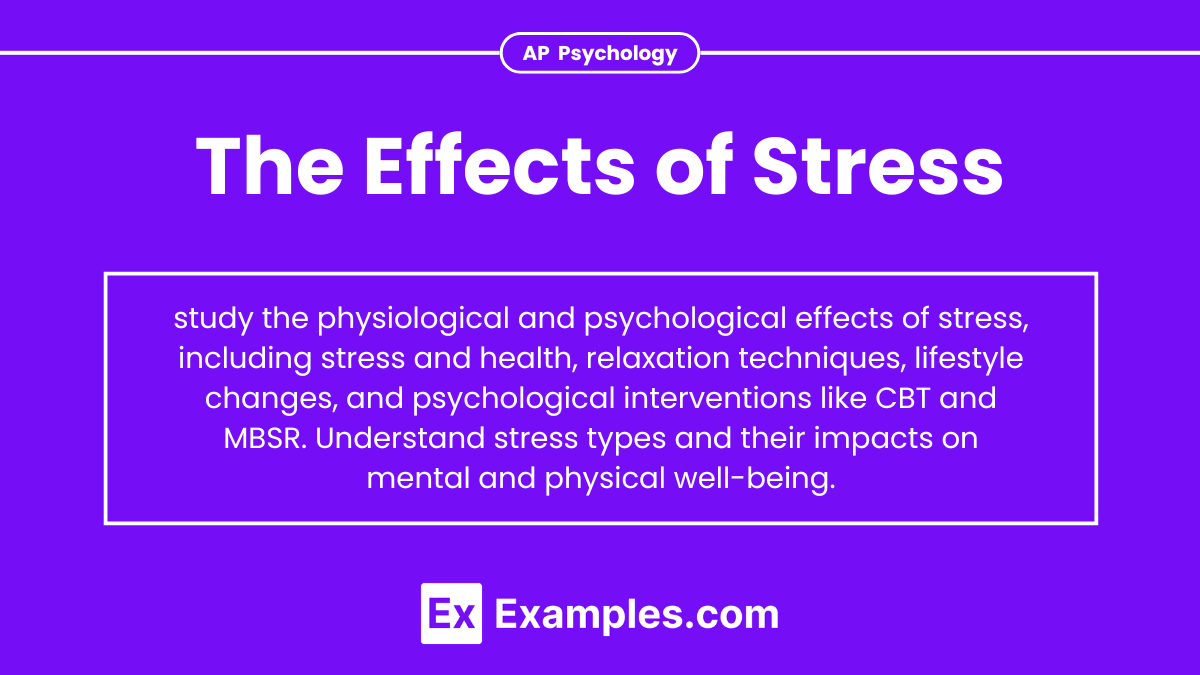Stress is a physical and psychological response to challenging situations. In AP Psychology, understanding stress involves studying its various forms, such as acute and chronic stress, and their impacts on the body and mind. Stress triggers the fight-or-flight aggressive response, influencing health and behavior. Chronic stress can lead to serious health problems, including cardiovascular and immune system issues. Recognizing and managing stress effectively is crucial for maintaining mental and physical well-being.
Learning Objectives
learn the different types of stress (acute, chronic, eustress, distress), and understand the physiological and psychological effects of stress, including the fight-or-flight response, long-term health impacts, and cognitive impairments. Study coping mechanisms, both adaptive and maladaptive, and examine how stress affects different populations. Be familiar with concepts like General Adaptation Syndrome (GAS) and psychosomatic disorders, and know effective stress management strategies.
Types of Stress
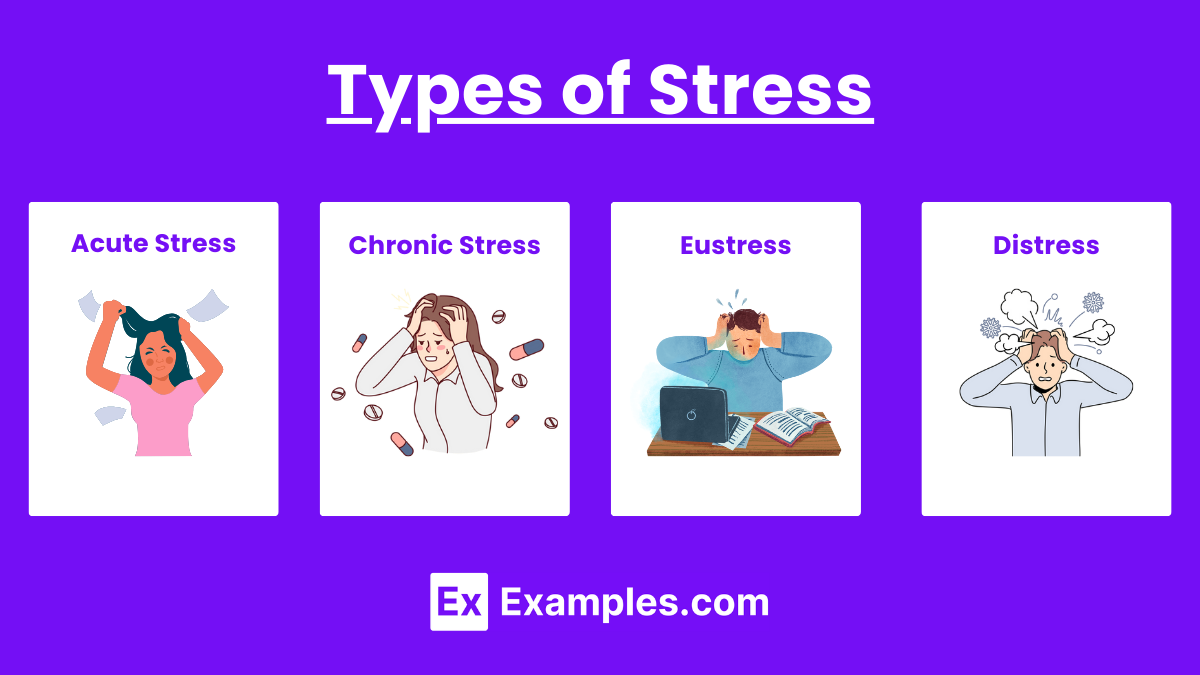
Acute Stress
- Definition: Short-term stress that arises from specific events or situations.
- Examples: Upcoming exams, job interviews, public speaking.
Chronic Stress
- Definition: Long-term stress resulting from ongoing situations.
- Examples: Financial problems, ongoing relationship issues, long-term illness.
Eustress
- Definition: Positive stress that motivates individuals.
- Examples: Starting a new job, planning a wedding plan, achieving a goal.
Distress
- Definition: Negative stress that can lead to health problems.
- Examples: Losing a job, death of a loved one, divorce.
Physiological Effects of Stress
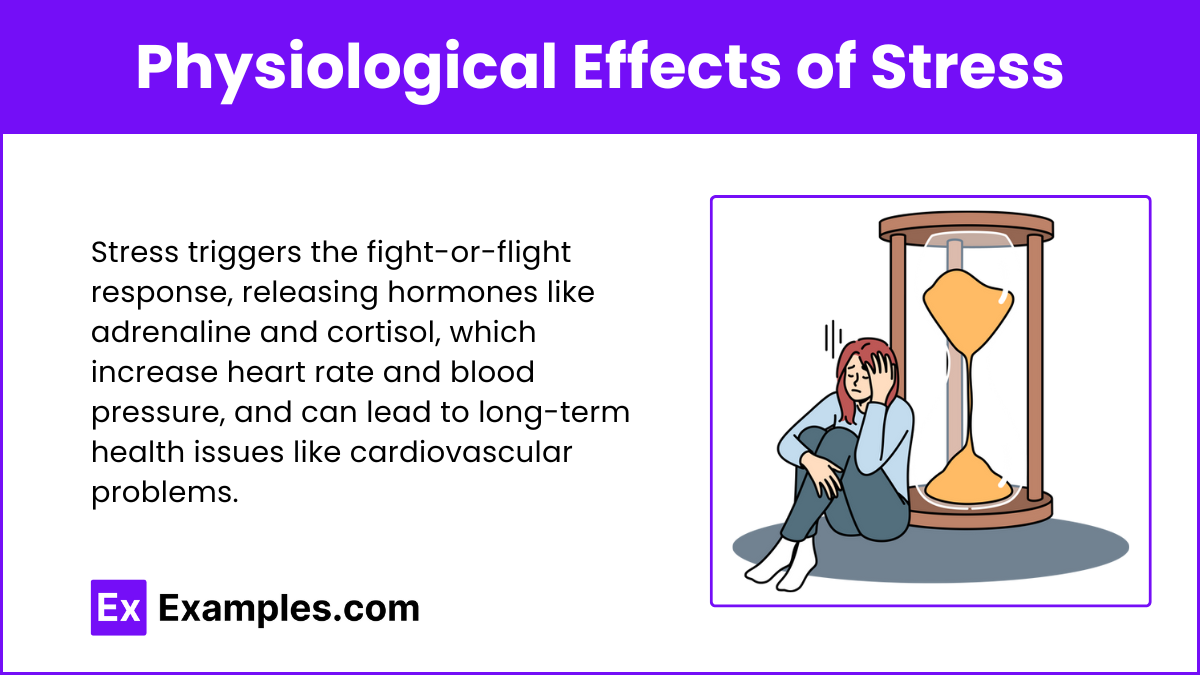
The Fight-or-Flight Response
- Description: A physiological reaction that occurs in response to a perceived harmful event or threat to survival.
- Mechanism:
- Activation of the sympathetic nervous system.
- Release of adrenaline and cortisol.
- Increased heart rate, blood pressure, and energy supplies.
Long-term Physiological Effects
- Immune System Suppression: Chronic stress Weaknesses the immune system, increasing susceptibility to illnesses.
- Cardiovascular Problems: Increased risk of hypertension, heart attacks, and strokes.
- Digestive Issues: Stress can cause ulcers, irritable bowel syndrome (IBS), and other gastrointestinal problems.
- Musculoskeletal Issues: Chronic muscle tension can lead to headaches and back pain.
- Endocrine System Impact: Stress affects hormone levels, leading to metabolic issues.
Psychological Effects of Stress
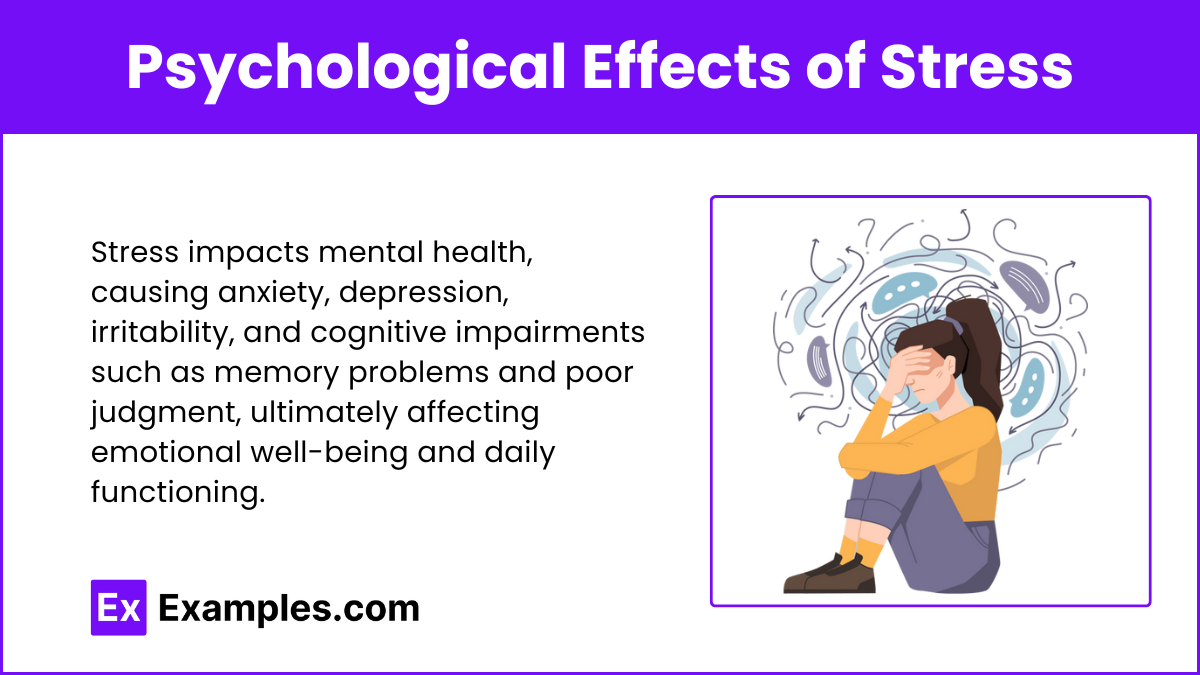
Cognitive Impairments
- Memory Problems: Difficulty concentrating and recalling information.
- Poor Judgment: Impaired decision-making and problem-solving abilities.
- Negative Thinking: Increased pessimism and worry.
Emotional Effects
- Anxiety: Persistent feelings of worry and fear.
- Depression: Prolonged sadness and loss of interest in activities.
- Irritability: Increased frustration and anger.
Behavioral Effects
- Changes in Appetite: Overeating or undereating.
- Sleep Disturbances: Insomnia or excessive sleeping.
- Substance Abuse: Increased use of alcohol, tobacco, or drugs.
- Social Withdrawal: Avoiding social interactions and activities.
Stress and Health

Psychosomatic Disorders
- Definition: Physical diseases that are thought to be caused or made worse by mental factors.
- Examples: Hypertension, asthma, and ulcers.
General Adaptation Syndrome (GAS)
- Developed by: Hans Selye.
- Stages:
- Alarm Stage: Immediate reaction to stressor, fight-or-flight response activated.
- Resistance Stage: Body attempts to resist or adapt to the stressor.
- Exhaustion Stage: Prolonged stress leads to depletion of body’s resources, resulting in decreased stress tolerance and potential health issues.
Coping Mechanisms
- Problem-Focused Coping: Addressing the problem causing the stress.
- Emotion-Focused Coping: Managing emotions in response to stress.
- Adaptive Coping Strategies: Exercise, meditation, seeking social support.
- Maladaptive Coping Strategies: Substance abuse, avoidance, unhealthy eating.
Impact of Stress on Different Populations
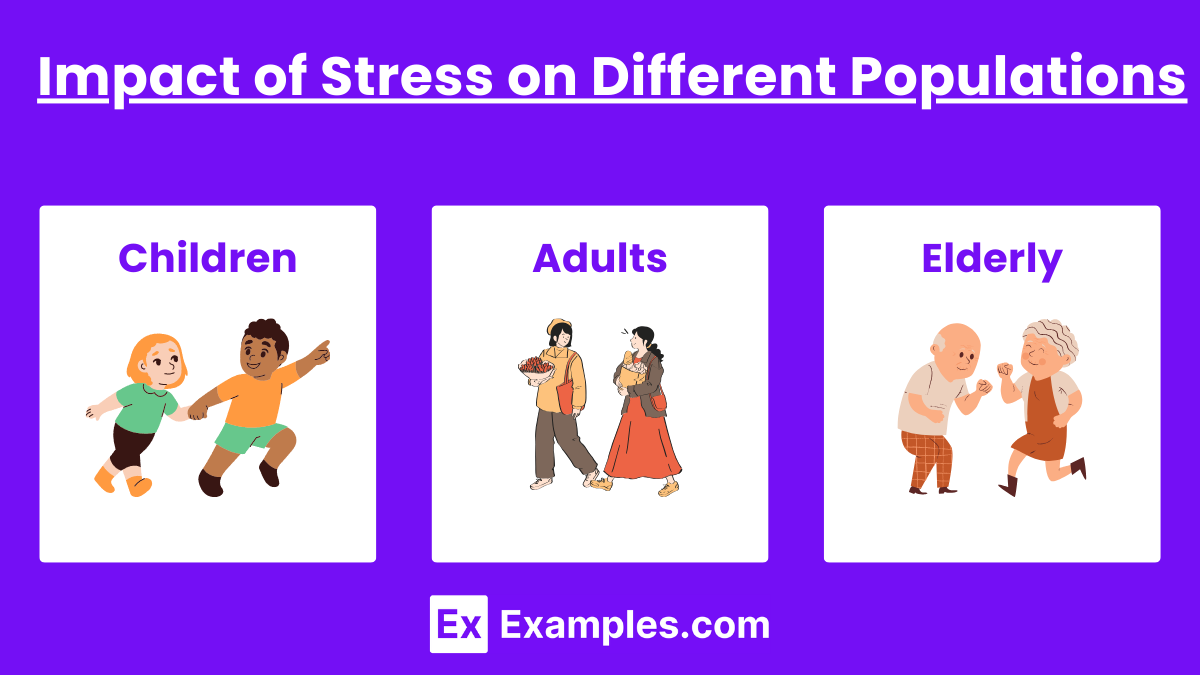
Children and Adolescents
- School Stress: Academic pressures, social challenges.
- Family Stress: Divorce, parental conflict.
Adults
- Work Stress: Job demands, work-life balance.
- Personal Life: Relationship issues, financial problems.
Elderly
- Health Concerns: Chronic illnesses, loss of loved ones.
- Isolation: Reduced social interactions.
Strategies for Managing Stress
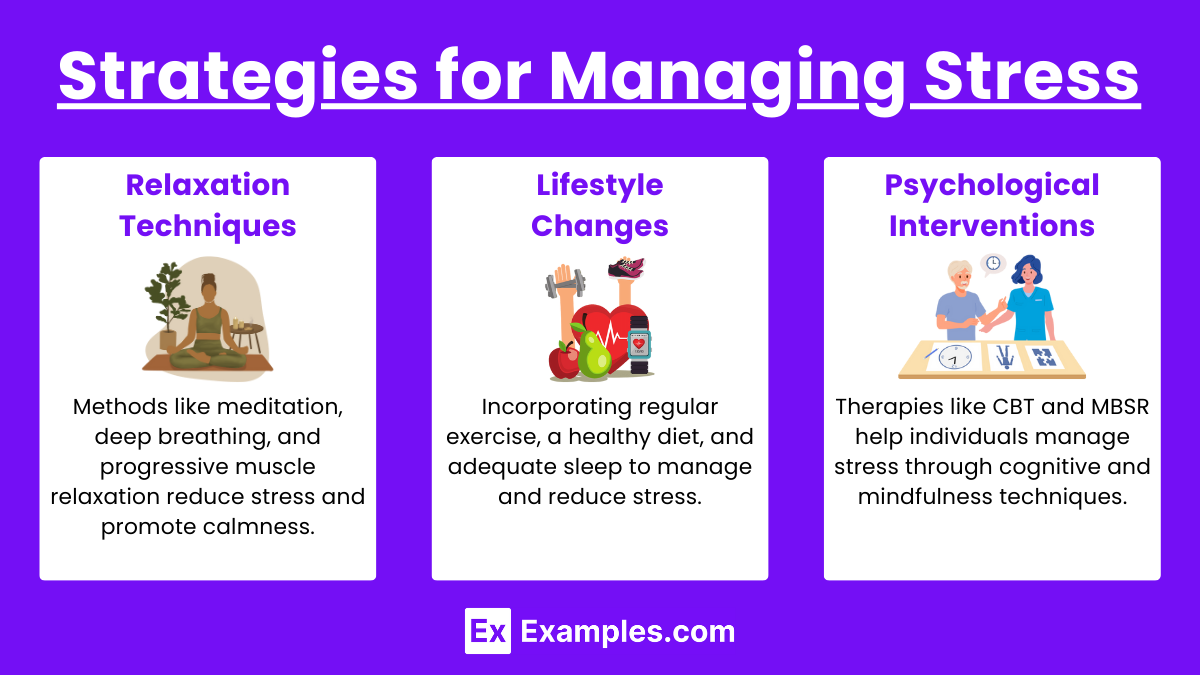
Relaxation Techniques
- Meditation: Focused breathing and mindfulness practices.
- Progressive Muscle Relaxation: Systematically tensing and relaxing muscle groups.
- Deep Breathing Exercises: Slow, deep breaths to reduce tension.
Lifestyle Changes
- Regular Exercise: Physical activity to reduce stress hormones.
- Healthy Diet: Balanced Nutrition Action Plan to support overall health.
- Adequate Sleep: Ensuring sufficient rest to recover from stress.
Psychological Interventions
- Cognitive Behavioral Therapy (CBT): Identifying and changing negative thought patterns.
- Mindfulness-Based Stress Reduction (MBSR): Mindfulness practices to reduce stress.
- Support Groups: Sharing experiences and receiving support from others.

